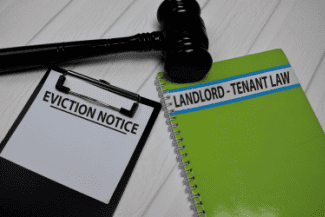This Prolific LA Eviction Law Firm Was Caught Faking Cases In Court. Did They Misuse AI?
KEY FINDINGS AT A GLANCE
-

- Six legal experts told LAist there’s a likely explanation behind the filing’s errors: misuse of a generative artificial intelligence program. They said they thought Block’s filing bears striking similarities to a brief prepared by a New York attorney who admitted to using ChatGPT back in May.
- Block’s firm was ordered to pay $999 over the violation. That’s $1 below the threshold that would have required the firm to report the sanction to the state bar for further investigation and possible disciplinary action.
- In interviews with three former clients and a review of 12 malpractice or negligence lawsuits filed against Block or his firm, LAist found more allegations of mishandled evictions.
When landlords in Southern California want to evict their tenants, they often hire Dennis Block. His law firm, Dennis P. Block and Associates, describes itself as the state’s “leading eviction law firm.”
Block once reportedly called himself, “A man who has evicted more tenants than any other human being on the planet Earth.”
But in one recent eviction case, Block didn’t just lose. His firm was also sanctioned for submitting a court filing a judge said was “rife with inaccurate and false statements.”
At first glance, the filing from April looks credible. It’s properly formatted. Block’s signature at the bottom lends a stamp of authority. Case citations are provided to bolster Block’s argument for why the tenant should be evicted.
But when L.A. Superior Court Judge Ian Fusselman took a closer look, he spotted a major problem. Two of the cases cited in the brief were not real. Others had nothing to do with eviction law, the judge said.
“This was an entire body of law that was fabricated,” Fusselman said during the sanction hearing. “It’s difficult to understand how that happened.”
The court never got to the bottom of exactly how the filing was prepared. But six legal experts told LAist they could think of a likely explanation: misuse of a generative AI program.
These programs, the best known of which is ChatGPT, have come under increasing scrutiny in the legal profession. While some lawyers see potential for reducing costs to clients, experts agree that failing to check work produced by such tools is risky and unethical.
Law professors and malpractice attorneys who reviewed Block’s filing told us — based on the language used — that’s likely what happened in this case.
“I think it’s virtually certain that the lawyer involved used some kind of [generative] artificial intelligence program to draft the brief,” said Russell Korobkin, a professor at UCLA School of Law who recently moderated a panel on AI in the legal profession.
Eviction is his ‘patriotic duty’
Eviction court cases center on a high-stakes question: Who gets to stay in their home, and who has to leave?
The outcomes for renters can be dire, in some cases leading to homelessness. It all unfolds in a court system that can move very quickly, with most tenants lacking access to an attorney.
In a 2007 interview with the Los Angeles Times, Block said evicting rent-controlled tenants was his “patriotic duty.”
Over the years, Block has distinguished his firm for its ability to handle large caseloads. His website says the firm has handled more than 200,000 evictions. In a 2018 court case, Block claimed his firm takes “upward of 500 unlawful detainer cases per month.”
At the same time, Block’s firm has faced criticism from many tenant advocates, as well as some landlords. An LAist investigation of court records found Block or his firm have faced 12 lawsuits filed by clients alleging their cases were mishandled.
Some of the lawsuits were dismissed because they were filed too late. Clients generally have one year to file a malpractice complaint against their attorney.
Other lawsuits were resolved without going to trial. In one 2018 case that did go to trial, a judge found Block’s firm “acted negligently and fell below the standard of care,” but ruled the landlord failed to show the negligence caused any provable damage.
Legal experts told us they thought the filing from Block’s firm that led to sanctions bears striking similarities to a brief prepared by a New York attorney who admitted in May to using ChatGPT. It was the first widely reported example of an attorney misusing ChatGPT since the tool debuted last year.
Like the New York filing, Block’s brief falls apart upon checking the case citations. It cited 51 Scott Street, LLC v. Sheehan (2019) and Cole v. Stevenson (1998), both of which are fictitious, according to the judge.
Case citations with ‘no basis in reality’
“This filing has the usual hallmarks of what’s known as a hallucination,” said Jonathan Choi, a professor at USC Gould School of Law who reviewed the brief at LAist’s request.
Hallucinations are a known problem in which programs like ChatGPT “tend to produce things that look convincing, but actually have no basis in reality,” he said.
Chris Hoofnagle, a professor at UC Berkeley’s School of Law, said the problem stems from how platforms like ChatGPT and other large language models (LLMs, for short) work.
Based on a user’s prompt, they mine vast troves of data to predict words that should come next in a sentence. They can produce stunningly detailed documents full of words seemingly written by a human. But often those words bear no relation to the truth.
“LLMs can generate fake information that basically is what you want to believe,” Hoofnagle said. “LLMs say these things in such an unqualified and confident way that they’re convincing.”
However the filing was created, legal ethicists said submitting fake case law violates a core duty in the legal profession.
“Any time you cite a case and a holding to the court, it has to be accurate,” said Deborah Wolfe, a San Diego malpractice attorney. “That’s your obligation. I don’t care how busy you are.”
And some legal experts told us the fact that defendants often represent themselves in venues like eviction court just heightens concerns about accountability.
Ari Waldman, a UC Irvine School of Law professor, said tools like ChatGPT — if left unchecked — could lead to miscarriages of justice.
“Someone is going to be thrown out on the street because a lawyer couldn’t bother doing research on their own,” Waldman said. “If that’s where our legal system is heading, we’re all in trouble.”
‘What do you have to say for yourself?’
Block did not agree to an interview with LAist. In an email responding to our requests for comment, he wrote, “It is apparent that you are simply intent on publishing a ‘hit piece’ against myself and my firm.”
Block said his firm “has been practicing for over 40 years and is the preeminent landlord/tenant law firm in Southern California. Needless to say, landlords rely on my firm to protect their interests as landlords and property owners.”
Block continued, “I will and cannot discuss matters that are confidential nor will I engage in a discussion where the sole objective is to simply smear my or my firm’s name.”
Block’s firm submitted the filing that cited fake court cases in April 2023 as part of a seemingly routine eviction case. His firm’s client said their tenant should be evicted over non-payment of rent. The tenant said their rent had been raised illegally. The court was left to sort it all out.
According to a 2019 report commissioned by the L.A. Right To Counsel Coalition, 97% of L.A. County renters lacked an attorney in unsealed eviction proceedings, while 88% of landlords had legal representation.
In this case, the tenant was represented. Lydia Nicholson, an attorney with the Los Angeles Center for Community Law and Action, had asked the court to rule on the merits of the lawsuit without going to trial, basically arguing the landlord had no case. Block’s firm filed an opposition to that motion. All fairly standard procedure. Until Nicholson sat down to read Block’s filing.
“I felt a little bit like I was completely misreading or misunderstanding what was happening,” Nicholson said in an interview. “It was one of the weirdest opposition briefs I have ever received.”
Court records show Fusselman also found the filing unusual. He scheduled a hearing to determine what repercussions Block’s firm should face. Block did not attend that hearing. One of his colleagues, attorney John Greenwood, showed up instead.
Fusselman began by asking Greenwood, “What do you have to say for yourself?”
Greenwood replied, “I have to say there was a terrible failure in our office. There’s no excuse for it.”
Greenwood said the attorney at Block’s firm responsible for drafting the filing relied on “online research.” He said “she didn’t check it,” and that she had since left the firm.
In a separate court filing, Block identified the attorney responsible for preparing the filing as a first-year lawyer admitted to the bar in November 2022. LAist reached out to her for this story, but she did not agree to an interview.
“We unfairly put her under a lot of pressure to get things out the door,” Greenwood said. “We don’t want to throw her under the bus.”
During the sanction hearing, Nicholson, the attorney representing the tenant, asked why Block hadn’t shown up in court to explain what went wrong. After all, Block was the one who signed the fabricated filing, Nicholson noted.
“I agree with you that by signing the pleading, Dennis Block, the buck stops with him,” said Fusselman, the judge. “But I’m satisfied that Mr. Greenwood was the person who was actually responsible for reviewing the document.”
Fusselman did not respond to a request for comment from LAist.
Concluding that Block’s filing appeared “to be frivolous,” Fusselman threw out the landlord’s lawsuit, allowing the tenant to remain in their home. The underlying eviction case is now sealed, a common practice in California when tenants prevail in court. Fusselman sanctioned Block’s firm for violating a section of California’s Business and Professions Code and ordered the firm to pay $999 to Nicholson’s firm.
Block wrote in a declaration to the court, “There was never an intent to mislead the court and I do apologize to the court and opposing counsel.”
‘More like a warning than an actual punishment’
By keeping the sanction just under $1,000, Fusselman allowed Block’s firm to avoid a requirement to report the violation to the state bar for further investigation and possible disciplinary action.
Erika Doherty, program director for the California State Bar’s Office of Professional Competence, said it’s possible opposing counsel may have filed a complaint, but any ongoing investigation would remain confidential.
Some L.A. tenant attorneys who often face Block’s firm in court think he got off easy.
“When a judge purposely keeps it under $1,000 … it feels more like a warning than an actual punishment,” said Alisa Randell, an attorney with the pro bono law firm Public Counsel.
Tenant defense lawyers interviewed for this story told us they’ve never seen another filing from Block’s firm quite like this one. But they said they frequently see landlord attorneys cutting corners and submitting cases they believe have questionable merits.
Joshua Johnson, a staff attorney with the Legal Aid Foundation of Los Angeles, said few tenants have the skills or training needed to spot these problems.
“That’s why we stress that tenants must have attorneys to fight these cases,” Johnson said.
The ‘fast and furious’ world of eviction court
Landlords file thousands of evictions in L.A. County every month. Court observers say the high volume and constant churn of eviction cases encourages slapdash work.
“The process itself is very oriented to this almost fast and furious style of case processing,” said Kyle Nelson, a policy analyst and researcher with the tenant rights group Strategic Actions for a Just Economy. “Everybody is completely overwhelmed.”
Evictions plummeted early in the pandemic after state and local governments put new COVID-19 renter protections in place. But Nelson said L.A. County eviction filings are now back to pre-pandemic levels.
Proposals to provide tenants with free attorneys in eviction court are currently under consideration by L.A. city council members and L.A. County supervisors. Proponents argue a “right to counsel” would even the playing field for tenants in danger of losing their housing.
“You have a system that’s supposed to be equitable, but it’s not,” said Javier Beltran, deputy director of the L.A.-based Housing Rights Center.
Eviction court judges in L.A. often hear dozens of cases in a single day. They issue rulings in a matter of minutes, all while attorneys and onlookers shuffle in and out of the courtroom and chat in the wings. Tenants without attorneys regularly struggle to understand what’s going on. Most landlords rely on lawyers to secure them a favorable outcome in court.
Beltran believes Block’s firm uses that imbalance to their advantage.
“Which then allows [Block’s firm] to evict folks in large mass, which then exacerbates the homeless crisis,” Beltran said.
Given the large caseloads and emphasis on working quickly, attorneys are under a lot of pressure to find new ways of speeding up their work, said malpractice attorney Heather Rosing.
“Lawyers are really, really busy people,” Rosing said. “It becomes understandable that a lawyer would turn to a new and innovative research tool — or at least something the lawyer believes is a new and innovative research tool — in order to get to the answers more quickly.”
But even under those pressures, Rosing said, lawyers have a duty to tell the truth in court. And attorneys have a duty to supervise their staff.
A ‘strong advocate for people who own rental housing’
Block was admitted to practice law in California in 1976. His profile on the state bar’s website shows no record of disciplinary action.
In a past interview with LAist for a 2023 article, Block said that despite assumptions that all landlords are wealthy, many of his clients are “mom and pops” relying on a small number of units for their income.
In a recent interview with podcaster John Williams, Block described his childhood and successful career.
“I grew up in a one-bedroom apartment with my mother and my sister,” Block said. “I now employ 26 attorneys. And I have a support staff — a total staff of 45 people — that are making their contributions to the government, paying their taxes. But somehow if you’re big, if you’re successful, then all of a sudden you’re not revered by society. You’re hated by society.”
Block regularly discusses L.A.’s ever-evolving rental housing regulations in online Q&As hosted by various landlord advocacy groups. In a July 2022 video streamed by the Apartment Owners Association of California, Block likened a city of L.A. eviction regulation to “state-imposed slavery” on landlords.
Arguing that the city’s eviction rules blocked landlords from removing tenants, even if they wanted to get out of the rental business, he said, “It’s forced labor at the very minimum.”
Block’s championing of landlord rights has won him a reputation as “a very aggressive attorney,” according to Daniel Yukelson, executive director of the Apartment Association of Greater Los Angeles (AAGLA).
“He is a real strong advocate for people that own rental housing,” he said.
Yukelson said Block is known for helping protect landlords from tenant advocates, who Yukelson said can at times use underhanded tactics.
“Renters who don’t comply with their lease agreements end up getting away with months of free rent, and oftentimes put owners in a position to pay out relocation fees,” Yukelson said. “In some cases, it’s like extortion.”
Block advertises in AAGLA publications and appears in their webinars. Yukelson said over the years, he has heard from only a small number of landlords unhappy with Block’s services.
“If I was getting inundated with complaints about Dennis Block, then I wouldn’t have him be associated with our association,” Yukelson said.
Common themes emerge in court records, online reviews
But some former Block clients have been less than satisfied.
An LAist review of L.A., Orange, San Bernardino, Riverside and Ventura county superior courts found that Block or his firm have faced 12 malpractice or negligence lawsuits since 2001.
In multiple cases, landlords alleged Block’s firm served their tenants notices to pay or quit — the first step toward an eviction — that failed to comply with legal requirements. Others alleged his firm made significant mistakes in routine court filings.
In 2011, one former landlord client alleged that after Block’s firm served his tenant a three-day notice to pay or quit, Block’s firm turned around and defended that same tenant against the eviction. According to court records, Block’s firm said they dropped the tenant after discovering the connection. The lawsuit was settled out of court.
Former Block clients have also aired their grievances outside of court. About 64% of the reviews on his firm’s Yelp page were one-star ratings as of early October 2023. About 28% were five-star reviews. We should note that not all Yelp reviews are genuine. Yelp has taken steps in recent years to better vet and remove illegitimate reviews.
LAist interviewed Ali Khan, who wrote one of those scathing reviews. He said he hired Block’s firm in early 2021 to pursue an eviction against a tenant in his South L.A. duplex. Khan said the tenant began subletting rooms without his knowledge, including to someone who moved in with a dog in violation of a no-pets policy.
“[Block] told me that I had a case,” Khan said, “that people don’t pay him for his good looks — they pay him to win cases.”
Khan said he was living in Maryland at the time. He said he didn’t know that L.A. city council members had voted to shield renters from evictions over unauthorized occupants and pets during the COVID-19 pandemic. Khan said Block’s firm failed to tell him how those protections could stall his case.
“They should have known the rules had changed,” said Khan, who was unsuccessful in court and ultimately paid the tenant to leave. “They were just taking me along for a ride so they could just continue to rack up the bill.”
A missed opportunity to settle
Other former clients of Block’s firm echoed Khan’s complaint about poor communication.
Tracey Adlai said she came to Block’s firm in an emotionally raw moment. Her father had just died, and her family was seeking help with evicting a tenant who refused to leave his Hollywood Hills condo.
“I hadn’t had time to grieve,” Adlai said, “and then was pushed into this role of being a landlord.”
The eviction case ended up dragging on for nearly two years.
In an ongoing lawsuit against Block for alleged professional negligence and breach of fiduciary duty, Adlai and her brother allege Block’s firm failed to properly communicate a potential settlement offer from the tenant early in litigation.
The letter from the tenant’s attorney suggested the tenant might consider leaving in exchange for a relocation payment of $21,200. Adlai said Block’s firm should have sent this letter to her brother, the administrator of her father’s estate and the plaintiff in the eviction case. Adlai herself was not a party to the eviction.
But, Adlai said, Block’s firm only sent that letter in an email attachment to her. She was in communication with the firm as part of her brother’s lawsuit. She told LAist she didn’t notice the email until months later. No one from Block’s firm ever followed up or called about it, she said — and no one sent it to her brother, the firm’s actual client.
“If this could have been wrapped up before going to a trial, it would have saved us hundreds of thousands of dollars,” Adlai said. The lawsuit claims more than $200,000 in damages, including legal fees, lost rent and other costs associated with maintaining the property while it was occupied by a non-paying tenant.
In a court filing responding to the negligence lawsuit, Block’s defense attorney Gary Starre wrote the complaint “is unintelligible and ambiguous.” He argued Adlai’s brother was Block’s client, not Adlai herself, and therefore she has no standing to sue. He also said it was filed one day after the one-year statute of limitations lapsed — which Adlai’s attorney disputes.
Adlai said despite more than $15,000 in legal fees paid to Block’s firm, she felt like none of the firm’s attorneys bothered to learn much about the eviction case — and none seemed to appreciate how important her father’s condo was to the family.
“We had to sell it to pay our legal fees,” said Adlai, who is currently renting a unit in the same building. “I always wanted this property. It was where my dad taught me about life.”
Adlai’s brother decided to drop Block’s firm and hire a different lawyer. The eviction case went to trial in September 2022. A jury decided the tenant had to leave her father’s condo. But after nearly two years of fighting, Adlai could no longer afford to move in.
‘Failure to comply’
Other former clients told LAist that Block’s firm passed their cases from attorney to attorney, with lawyers at times coming to important court dates appearing unknowledgeable and unprepared.
“It was always a different person,” said Marie Frazier, an L.A. real estate agent who helped two of her former homebuyers with limited English skills pursue an eviction with Block’s firm.
“They just didn’t seem professional,” said Frazier of Block’s firm. “Everything was very last minute.”
After seeking for more than six months to evict a non-paying tenant, the homeowners were hoping for resolution. Their trial was scheduled in May 2021. But on their day in court, Frazier said their attorney from Block’s firm, Marat Antonyan, wasn’t ready.
“Things seemed to go south pretty quickly when the attorney could not answer the judge’s questions about simple, basic stuff,” said Frazier, who was with the couple that day in the Stanley Mosk courthouse in downtown L.A.
L.A. County Superior Court Judge George Bird grilled Antonyan about why he failed to meet and confer with the tenant’s lawyer ahead of the trial.
“We have a different attorney checking the emails,” Antonyan said, according to an audio recording of the hearing. The defense “probably sent it to our office email, not to my email,” he said.
Antonyan did not respond to an email from LAist asking for comment. Former clients and tenant attorneys told LAist that Block’s firm tends to route messages through one central email address, which they believe worsens communication.
The judge pushed the trial back almost three months, saying, “It appears the case is not ready for trial because of the plaintiff’s failure to comply with the court rules … It is with a heavy heart that I continue these trials, given that the plaintiff has waited a very long time for their day in court.”
Frazier, the real estate agent trying to help her buyers, said the whole experience was “humiliating.” She said, “I just remember sinking into my chair.”
The homeowners eventually dropped the case. To this day, the tenant continues to occupy the property rent-free, Frazier said. And Block’s firm continues to bill the homeowners for past work.
“I don’t think they did much work on it,” she said. “I don’t understand why they just don’t give up with the billing.”
Source: LAist















 Accessibility
Accessibility